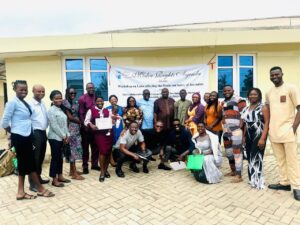Participants at a training workshop organized by Media Rights Agenda (MRA) comprising journalists from broadcast, print and online media from different states across the South-west geo-political zone of Nigeria, have called on Governments at the Federal and State levels, law enforcement and security agencies as well as the military and intelligence services to refrain from abusing and misusing laws and regulations to impede the work of journalists.
The participants made this and other recommendations at a two-day workshop for journalists on “Laws Affecting the Media and Safety of Journalists in Nigeria”, which took place on August 6 and August 7, 2024, in Abeokuta, Ogun State.
The workshop, attended by about 30 participants, was organised by MRA with support from the MacArthur Foundation through the Wole Soyinka Centre for Investigative Journalism (WSCIJ) under the Collaborative Media Engagement for Development, Inclusivity and Accountability (CMEDIA) Project, a multi-level intervention that supports media independence, improved transparency, accountability, and good governance in state and local governments with more public awareness on the need for accountability, and amplified marginalised voices.
The workshop was aimed at providing an overview to the participating journalists of the current legal framework governing the media in Nigeria; to offer practical guidance on ensuring compliance with media-related laws; and to foster a collaborative environment for addressing challenges faced by journalists.
Consisting of plenary presentations and break-out sessions that were characterized by vibrant discussions, workshop sessions covered a range of topics and issues crucial to journalism practice, including national, regional and international frameworks on freedom of expression, media freedom and the safety of journalists; legal frameworks that are inimical to media freedom in Nigeria; digital security and common digital threats to journalism practice; ethics in journalism practice in Nigeria.
Other topics treated were: Beneficial legal frameworks for journalists and the media in Nigeria; how to avoid legal liabilities as journalists; how to protect information, systems, confidential sources and contacts; and avenues for journalists to obtain legal and litigation support.
The participants emphasized the significance of having a good understanding of the laws and regulations affecting the media and the practice of journalism as well as the Code of Ethics for Nigerian Journalists in order to report ethically and professionally, better protect themselves, assert their rights and freedoms, and ensure that they can carry out their professional duties without undue interference or the fear of retribution.
They noted that the right of journalists to cover protests, whether violent or not, and to report reactions to protests by government officials and other actors, is well-established and protected under international human rights laws and called on Federal and State governments to fulfill their obligations to protect journalists covering the protests while ensuring that those who attack, harass or intimidate journalists in the course of carrying out their professional functions are brought to justice.
They recognized the increasing importance of keeping abreast of digital security trends and developments in order to avoid various digital threats and attacks as well as to mitigate their negative impact on journalism practice.
They called for collaboration among media stakeholders to address common threats and challenges as well as to provide solidarity and support in times of need.
They urged media owners and managers to be more responsive to the needs and welfare of journalists working in their organizations, including by providing adequate support and assistance whenever such journalists are facing challenges as a result of their work, whether of a legal nature or otherwise.
The workshop concluded that in light of the scale of legal challenges faced by journalists and other media professionals, a legal support fund should be established alongside a national network of lawyers who can be called upon to assist journalists facing legal challenges or other forms of challenges requiring legal interventions.
Please download and read the full communiqué here.







